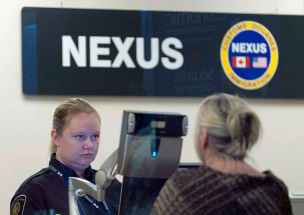Solution needed for border-security impasse
Read this article for free:
or
Already have an account? Log in here »
To continue reading, please subscribe:
Monthly Digital Subscription
$0 for the first 4 weeks*
- Enjoy unlimited reading on winnipegfreepress.com
- Read the E-Edition, our digital replica newspaper
- Access News Break, our award-winning app
- Play interactive puzzles
*No charge for 4 weeks then price increases to the regular rate of $19.00 plus GST every four weeks. Offer available to new and qualified returning subscribers only. Cancel any time.
Monthly Digital Subscription
$4.75/week*
- Enjoy unlimited reading on winnipegfreepress.com
- Read the E-Edition, our digital replica newspaper
- Access News Break, our award-winning app
- Play interactive puzzles
*Billed as $19 plus GST every four weeks. Cancel any time.
To continue reading, please subscribe:
Add Free Press access to your Brandon Sun subscription for only an additional
$1 for the first 4 weeks*
*Your next subscription payment will increase by $1.00 and you will be charged $16.99 plus GST for four weeks. After four weeks, your payment will increase to $23.99 plus GST every four weeks.
Read unlimited articles for free today:
or
Already have an account? Log in here »
Hey there, time traveller!
This article was published 08/11/2022 (1127 days ago), so information in it may no longer be current.
Anyone who has boarded a flight to or from the United States understands the frustration: long, slow-moving lines through security and customs-clearance checkpoints that try the patience of travellers and occasionally result in missed connections and related incremental costs of money and time.
In an effort to lessen the stress, Canada and the U.S. in 2002 jointly created the “trusted traveller” program, under the Nexus banner, to allow approved card-holders to fast-track their clearance process, thereby also shortening the security-screening process for those in the non-holders’ line.
An associated program, known as Fast, streamlines and speeds up the process of cross-border shipping of commercial products.
The Nexus program proved popular, with 1.7 million cards having been issued as of May 2021. But as it did with so many aspects of travel, the pandemic put a serious crimp in trusted-traveller access. As travel restrictions were imposed to mitigate the spread of the virus, Nexus enrolment facilities inside Canadian airports were closed, making it necessary for those seeking to apply for trusted-traveller status to travel to a limited number of offices across the U.S. border.
A massive backlog resulted, with a reported 490,000 Canadians now waiting to have their applications approved. Most Nexus offices on the other side of the border currently have no appointments available for the required in-person interview, while those that are booking appointments are doing so well into 2023.
Exacerbating all this is the fact Nexus offices inside Canadian airports have not resumed operations as travel restrictions eased, owing to an ongoing dispute between the two countries related to legal protections afforded to U.S. Customs and Border Protection (CBP) officers who work in Nexus offices in Canada. American officials are insisting those officers should have the same protections as other CBP personnel handling preclearance at Canadian airports and land border crossings.
THE CANADIAN PRESS files Public Safety Minister Marco Mendicino
With the situation at an impasse and with the U.S. now threatening to cancel the Nexus/Fast program completely, Canada’s business community has decided enough is enough, and it’s time for this country’s government to find a solution that will avoid the significant economic and personal impacts the programs’ cancellation would bring.
“Having a jointly managed trusted-traveller program is essential, both to foster economic growth and to deepen the ties between our countries’ citizens,” a consortium of nearly 60 business groups wrote in a Nov. 4 letter to Public Safety Minister Marco Mendicino and U.S. Homeland Secretary Alejandro Mayorkas.
It was reported earlier that a central concern in the dispute was a disagreement over the right for U.S. personnel to carry sidearms while working in Canadian-airport Nexus offices, but Mr. Mendecino this week called those reports untrue. While the precise nature of the outstanding issues remains unclear, what is clear is that a solution is needed, and soon.
What remains, then, is arriving at an outcome that lessens travellers’ stress and alleviates the growing backlog of Nexus applications. David Cohen, the U.S. ambassador to Canada, declared last week this is “Canada’s problem to solve,” and that the U.S. will not resume the programs without assurance of legal rights for its officers.
As it’s apparent the U.S. holds most of the cards in this standoff that has the very existence of the programs at stake, it would seem the next move belongs to Mr. Mendicino. That will require, as the business groups said in their letter, “creativity and commitment to urgently resolve the outstanding issues.”
As anyone who’s been inconvenienced by airport lineups can attest, Canadians’ patience on this front has grown very, very thin.








